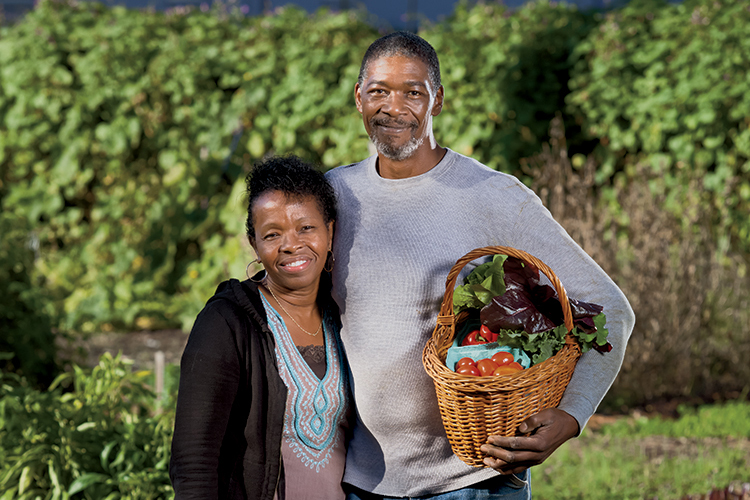Home > Tennessee > Tennessee Crops & Livestock > Growing It All: Specialty Crops Flourish in Tennessee
Growing It All: Specialty Crops Flourish in Tennessee
In partnership with: Tennessee Department of Agriculture

From west Memphis to East Tennessee, farms large and small grow specialty crops – fruits and vegetables, flowers and ornamentals, nuts, mushrooms and more. The U.S. Department of Agriculture’s Specialty Crop Block Grant program, administered by the Tennessee Department of Agriculture (TDA), helps improve Tennessee production.
Growing Gardens and Youth
Landmark Training Development Company, in the Orange Mound neighborhood of Memphis, tends gardens full of nutritious vegetables.
“Our mission is to use specialty crops to create sustainable agricultural environments in food desert communities,” says Mike Minnis, who organized Landmark in 2010.
Minnis’ original aim was to teach construction skills to Memphis youth.
“We planted some garden beds on property we had received from the city rehab, he says.
The gardens produced a bumper crop of specialty, multicolored carrots. Minnis asked the produce manager at a nearby Whole Foods what the carrots were worth.
“When he saw those carrots, grown right here, he wanted to buy them,” he says.

Landmark later received a Specialty Crop Block Grant in 2013 to help establish a honeybee hive on the properties. Bees pollinate the gardens and educate garden guests.
“We host many educational tours for school and community groups,” Minnis says.
Landmark’s gardens supply its food pantry, while some produce is sold at the Landmark Farmers Market. Carrots, cherry tomatoes and okra are also delivered to the nearest Whole Foods store.
“We do all the work in our gardens by hand – digging, weeding, picking,” Minnis says. “It’s more laborious but we have the youngsters to pull the weeds.”
Landmark works with Shelby County’s juvenile justice program to help young people fulfill community service requirements. Specialty Crop Block Grant funds awarded in 2014 and 2015 helped develop two simple greenhouses, called high tunnels, at Landmark’s sites.
“The high tunnels extend our growing season and have created excitement in our community,” Minnis says. “It’s another way we teach our neighbors about nutritious food choices that we can grow right here.”
Thunder Road Wine Trail
From Knoxville to Butler, wineries along the Thunder Road Wine Trail are using history to bring visitors to East Tennessee tasting rooms.
“Our Tennessee winemakers are making outstanding wines with regional grapes, and people need to stand up and take notice,” says Rick Riddle of The Winery at Seven Springs Farm in Union County.
Riddle founded the trail to complement the region’s tourism industry; it was themed around the route Kentucky moonshiners would take when going south during the Prohibition Era. A 2015 Specialty Crop Block Grant helped the trail’s six wineries develop a first-class website and other marketing materials.
“Every one of these wineries is less than three years old,” Riddle says. “To have the specialty crop grant helping with this is instrumental.”
Riddle says his research found wine trails help fuel tourism growth, and he sees the wine trail as a full circle to the past.
“Growing crops for brewing and distilling was vital to East Tennessee’s economy in the 1800s,” he says. “Today, tourism is our No. 2 industry, and wine trails can increase tourist revenues.”

Second Harvest
Second Harvest Food Bank of Northeast Tennessee – serving Carter, Greene, Hancock, Hawkins, Johnson, Sullivan, Unicoi and Washington counties – received a 2015 Specialty Crop Block Grant to assist in collecting farm-donated produce.
“Local farmers are encouraged to plant an extra acre and donate the food or the proceeds from the sale of the harvest to their local food bank,” Executive Director Rhonda Chafin says.
Second Harvest collected 73,000 pounds of farm-fresh Tennessee produce during the summer of 2015, including 25,000 pounds of green beans.
“The grant reimbursed some of the transportation costs and helped purchase mini produce bins, making it easier for farms to donate,” says Tom Cromie, senior operations director.



